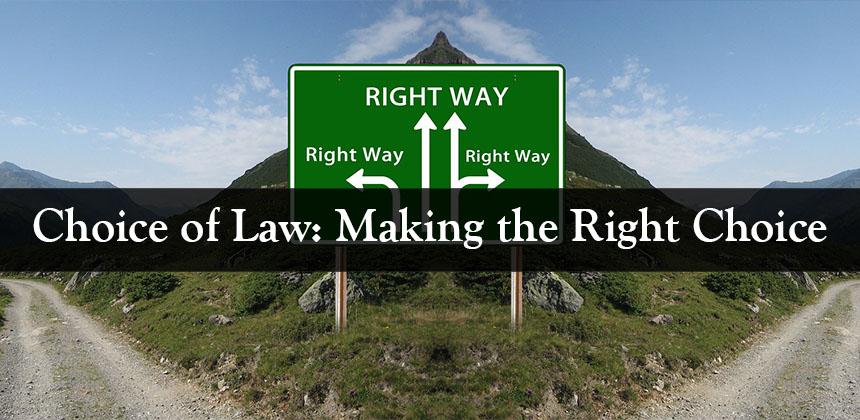
A choice of law clause (also known as a governing law clause) in a contract is used to determine which state or country’s laws will be used to interpret the agreement the clause is found in. In today’s modern contracting world, a choice of law clause is a standard provision found in most contracts – regardless of what subject matter they are in.
Why is a choice of law clause important?
To start with, eliminating uncertainty in contracts reduces drawn-out disputes and high legal bills. By selecting an applicable body of law that you are familiar with will reduce the uncertainty and high cost that goes with such uncertainty. And while money is always an extremely important consideration, more importantly, is the outcome that can result due to having a particular set of laws apply.
When it comes to the laws of states (or in some cases, countries), variations are endless. Having the particular law of a state or country apply can, in many instances, change the outcome of how a dispute is handled.
What does a choice of law clause look like?
Examples of choice of law provisions:
- “This agreement shall be governed by the laws of _________”
- “This agreement shall be governed, construed, and enforced in accordance with the laws of _____________, without regard to its conflict of laws rules.”
- “This agreement and all acts, transactions, disputes and controversies arising hereunder or relating hereto, and all rights and obligations of the parties shall be governed by, and construed in accordance with, the internal laws (and not the conflict of laws rules) of ________________.”
Choice of Law vs. Jurisdiction
Governing law clauses apply to the law that will be applied in a contract dispute while jurisdiction addresses which courts can resolve a dispute (and therefore in which court a lawsuit can be filed).
In plain English, this means that it is possible for a court in a different state or country to apply the laws of another state or country. For example, if the choice of law provision states that California law applies to the contract, but has a jurisdictional provision that gives New York federal courts the authority to hear disputes, while the dispute will be brought in New York, the New York court will apply California law.
What does a jurisdictional clause look like?
Examples of jurisdictional provisions:
- “The parties submit all their disputes arising out of or in connection with this Agreement to the exclusive jurisdiction of the courts of ________”
- “The parties hereby irrevocably submit to the exclusive jurisdiction of the courts of ______________ for the purpose of hearing and determining any dispute arising out of or in connection with this agreement or its formation or validity and for the purpose of enforcement of any judgment against their respective assets.”
Enforceability
Each jurisdiction has their own rules with respect to the enforceability of applying a choice of law of another state or country.
New York courts will generally enforce contractual choice of law provisions. However, it will not do so when either the provision is illegal, there is no reasonable relationship between the provision and the parties or transaction, or when honoring the provision would go against a fundamental principle of justice, good morals, or tradition.
Conclusion
Whether you are deciding to either include a choice of law provision in an agreement or agree to the choice of law presented to you in an agreement, there are many considerations that need to be taken into account. To ensure your interests are best protected, it would be wise to have an experienced business lawyer review an agreement before you decide to sign it. For more information, feel free to contract us.
—
Julian Cordero is an Attorney, Music Producer, and Entrepreneur. Oh and he blogs too! Julian is licensed to practice law in New York and is the Managing Member of Cordero Law LLC, a New York City based law firm focusing on Business Law, Entertainment Law, and Intellectual Property.
